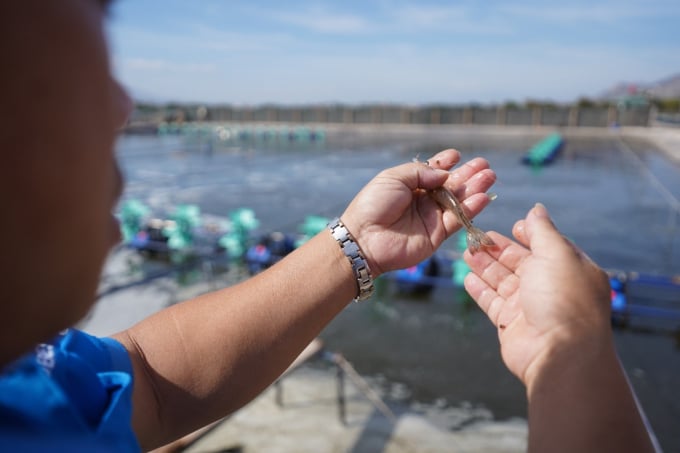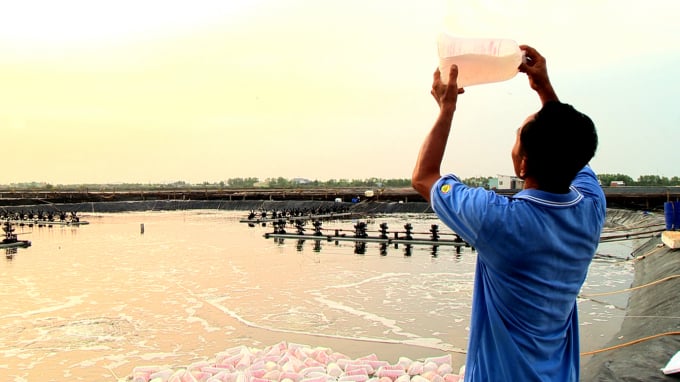November 28, 2025 | 01:29 GMT +7
November 28, 2025 | 01:29 GMT +7
Hotline: 0913.378.918
November 28, 2025 | 01:29 GMT +7
Hotline: 0913.378.918
Shrimps can die as early as 30 days after release. The death rate may reach over 70% if no preventive measure is taken or the shrimps are not treated timely.
According to the Southern Hydrometeorological Station forecast, from now to the end of June 2021, the weather in the whole southern region will be commonly sunny during the day with temperatures standing between 23-24 degrees Celsius. The lowest temperature is 20oC. There are some chilly days in the early morning and heavy rain in the evening.

The erratic rainy and sunny weather makes changes to the water environment in shrimp ponds, thus easily causing early mortality syndrome.
Food sources need to be a focus in the prevention and treatment of shrimps with the early dying syndrome in the hot season
According to many shrimp farming households, as an “appointment”, the time between the end of the second quarter and the beginning of the third quarter every year always gives them a headache. The weather changes cause problems including many diseases of which the most dangerous is the phenomenon of premature death for shrimp. A senior shrimp breeder in Bac Lieu said: “When it rains for several times, the shrimp starts to change color, then swim leadenly, weakly and even staggeringly near the pond side. At first, I had no experience in handling it, so the shrimp died much before I could react."
Early mortality syndrome (EMS) is one of the dangerous syndromes that seriously affects farmed shrimp (both white leg shrimp and black tiger shrimp). There are many causes leading to EMS, but the main one is due to acute hepatopancreatic necrosis disease (AHPND). The sudden appearance of the first rains causes organic items on the ground to drift into ponds, washing away alum. The ecosystem of the pond environment is broken making the resistance and the immune system in the shrimp body reduce… The temperature and salinity of the shrimp pond increase with an increasing density of algae that produces Vibrio Parahaemolyticus bacteria, creating toxins that affect the hepatopancreas of farmed shrimp.

It is necessary to focus on clean sources of shrimp breeds to limit infection.
According to the agricultural sector’s recommendations, farmers need to take preparation steps such as cleaning ponds, and necessary isolation from neighboring infected ponds to avoid spreading the disease on a large scale. EMS often occurs in the first month of release, so farmers must regularly check shrimps and treat immediately if they have signs of hepatopancreas swelling, pale color and black spots on the shell.
Farmers can actively and closely manage water quality, regularly check the bacteria content in the pond, ensure the shrimp breeds’ quality, clean the tools used in the shrimp farm, use probiotics that prevent pathogens or bacteria from multiplying, avoid the abuse of drug that can destroy the shrimp’s liver and pancreas.
Experts said that a leading solution to help prevent early mortality syndrome is to counteract from the inside with clean organic or functional foods for shrimp to be healthy and improving the resistance capacity. Typically, Grobest Vietnam's Super Shield functional food can be used right from the breed release stage to increase immunity.

Shrimp farmers in Bac Lieu are excited when their shrimp grow strongly and are disease-free thanks to the use of Super Shield functional food.
Unlike drugs that have the risk of destroying the liver - pancreas of shrimp or with dangerous residues, Super Shield functional food is not a drug, can be used for a long time to help increase the shrimps’ immunity, protect their intestines and intestines as well as improve their disease resistance capacity.
Super Shield functional food also contains vitamins and amino acids to help supplement essential nutrients, meet the needs of enzymes and micro-elements, and promote healthy growth of shrimp.
Farmers can use Super Shield before a change in the environment or before the disease season. In the time of changing seasons and erratic weather like now, the use of functional food is essential to prevent diseases for shrimp ponds.
Translated by Linh Nguyen

(VAN) According to Mr. Vo Minh Thanh, Director of the Tay Ninh Department of Agriculture and Environment, Resolution 57 has created a new development pathway for the locality, shifting from traditional toward modern agriculture.
/2025/11/26/4909-2-154329_878.jpg)
(VAN) Pearl grouper farming in HDPE cages not only delivers economic efficiency but also contributes to protecting the environment, creating jobs, and promoting marine-based experiential tourism.

(VAN) The model of making a living under the forest canopy through the agroforestry system in Van Son commune, Bac Ninh province, is expected to generate an annual income of approximately VND 30 million/ha.

(VAN) Many enterprises in Can Tho are harnessing natural energy and reducing greenhouse gas emissions in their production processes, thereby contributing to the promotion of a sustainable green transition.
/2025/11/24/3536-2-112800_176.jpg)
(VAN) Dong Nai now has tens of thousands of hectares of forests certified for sustainable management, and this area will continue to be expanded in the coming period.

(VAN) Vinh Ha hamlet (Dai Xuyen commune, Hanoi) is shifting away from small-scale farming as households adopt bioscurity into their breeder chicken models.

(VAN) Heavy rains make aquatic species more vulnerable to disease. Proactive water management and high-tech systems help farmers prevent outbreaks and protect yields.